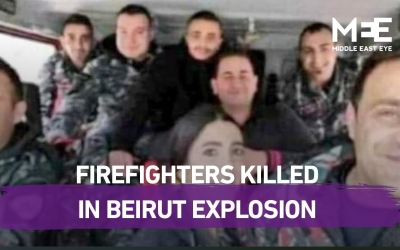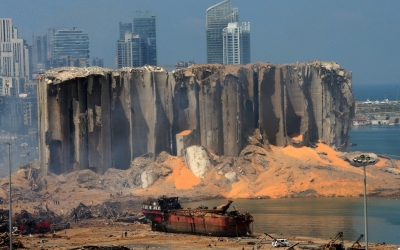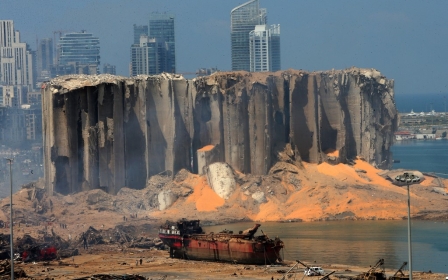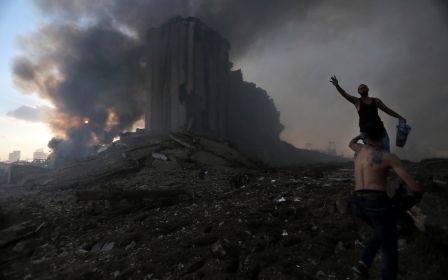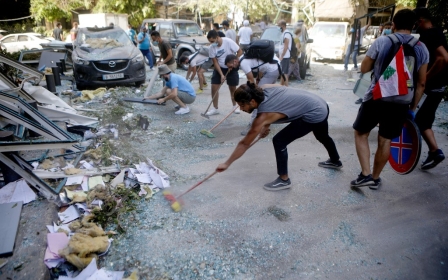Beirut explosion: Macron calls for international probe as port officials' accounts frozen
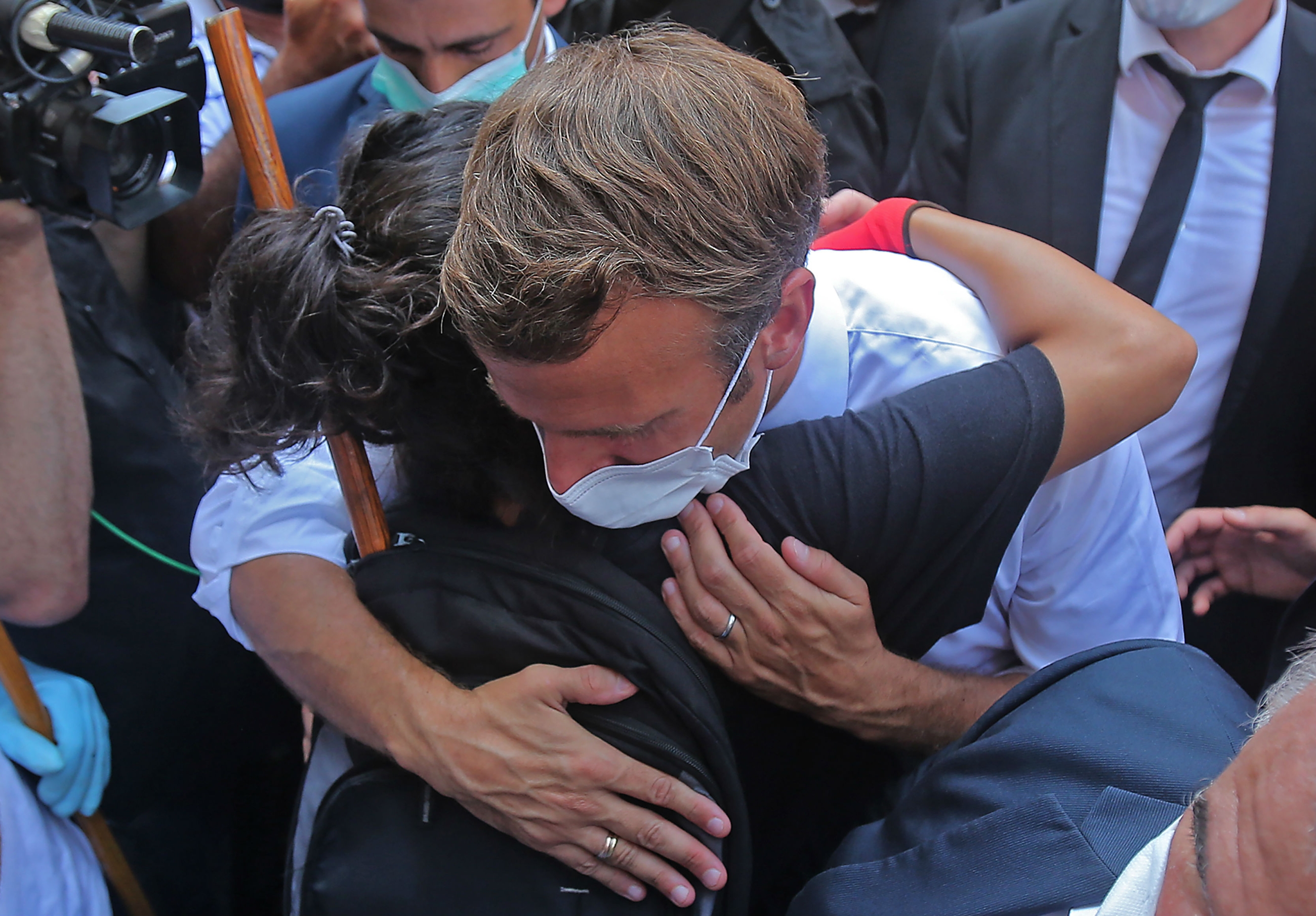
French President Emmanuel Macron has called for an international probe into Tuesday's explosion which left scores of people dead and thousands wounded in Beirut.
Speaking at the end of his surprise snap visit to Lebanon, Macron said there would need to be foreign involvement to make sure the causes and culprits of the blast at Beirut's port, which devastated much of the country's capital, would be brought to justice.
"An international, open and transparent probe is needed to prevent things from remaining hidden and doubt from creeping in," he told reporters.
His comments came shortly after it was revealed that Lebanon's central bank froze accounts belonging to the heads of Beirut port and Lebanese customs, along with five others, according to a central bank directive seen by Reuters and confirmed by the central bank.
The directive, dated 6 August, from the central bank special investigation commission for money laundering and terrorism-fighting, said the decision would be circulated to all banks and financial institutions in Lebanon, as well as the public prosecutor in the appeals court and the head of the banking authority.
It said the freeze and the lifting of banking secrecy would apply to accounts directly or indirectly linked to Beirut port general manager Hassan Koraytem, Lebanese customs director-general Badri Daher and five others, including present and former port and customs officials.
'Carry out reforms, change the system'
Two days on, Lebanon is still reeling from a blast so huge it was felt in neighbouring countries, with its mushroom-shaped cloud drawing comparisons to the Hiroshima atomic bomb that was dropped 75 years ago on this day.
The explosion was caused by the ignition of around 2,700 tonnes of ammonium nitrate which had been left at the port since 2013, though other details surrounding the incident are still not clear.
The provisional death toll stands at 145 but, with dozens missing and 5,000 wounded, the number of victims was expected to rise as rescue workers continued to comb through the rubble. Much of the city is lying in ruins.
It has sparked fury from many in Lebanon who see the explosion as a direct result of institutional negligence and corruption among the country's political class and bureaucracy.
Shortly after landing on Thursday, Macron said he would propose a "new pact" to Lebanon's political leaders. Macron said France's solidarity with the Lebanese people was unconditional, but said he wanted to tell some "home truths" to political figures.
"Beyond the blast, we know the crisis here is serious, it involves the historic responsibility of leaders in place," Macron told reporters. "We can't do without telling each other some home truths," he added. "If reforms are not carried out, Lebanon will continue to sink."
He mentioned reforms of the energy sector, public tenders and the fight against corruption.
Speaking later to a crowd during a walkabout in one of the neighbourhoods obliterated by the blast, Macron said he would ask the country's political establishment "to carry out reforms... to change the system, to stop the division of Lebanon, to fight against corruption".
Members of the crowd chanted "the people want the fall of the regime" as he spoke, indicating the widespread anger in Lebanon at a political class whose mismanagement and corruption they blame for Tuesday's disaster.
Ammonium nitrate: What is it and how did it get to Beirut's port?
+ Show - HideThere are still many details surrounding the cause of the explosion that devastated much of Beirut on Tuesday that remain murky and unexplained.
However, the Lebanese government has so far indicated that they believe the enormous blast to have been the result of 2,700 tonnes of the chemical compound ammonium nitrate left lying in a warehouse in Beirut port since 2013.
Middle East Eye has compiled a quick guide to the destructive compound and the circumstances surrounding its fateful detonation on Tuesday.
What is ammonium nitrate?
Ammonium nitrate is an industrial chemical commonly used for fertilisers, but also as an explosive, often used in mining.
The chemical, known by the formula NH4NO3, is a naturally white crystalline solid and is often known as saltpetre.
Under most conditions ammonium nitrate is not necessarily dangerous and is relatively stable - it can even be used to smother a fire.
However, if contaminated it can become highly volatile.
What previous incidents have there been?
The most notorious confirmed ammonium nitrate explosion prior to Tuesday was the 1947 Texas City Disaster.
On 16 April 1947, at the Port of Texas City, 2,300 tonnes of ammonium nitrate exploded, killing almost 500 people.
More than 5,000 people were injured and at least 1,000 buildings levelled in the surrounding area.
It was the deadliest industrial accident in US history and resulted in the first-class action lawsuit against the US government on behalf of 8,485 victims.
A more recent incident involving ammonium nitrate took place in 2015 when a series of explosions at a chemical plant in the Chinese port city of Tianjin killed 173 people and injured 798.
Among the blasts at the port was the detonation of 800 tonnes of ammonium nitrate.
Eventually Chinese courts handed jail sentences to 49 government officials and warehouse executives and staff over their involvement in circumventing and loosening safety standards enabling the storage of dangerous chemicals.
How did the chemical end up in the port?
The chemicals originally arrived at Beirut's port on board a Russian-owned cargo vessel flying a Moldovan flag in September 2013.
The shipping monitoring organisation ShipArrested.com at the time reported that "upon inspection of the vessel by Port State Control, the vessel was forbidden from sailing. Most crew except the master and four crew members were repatriated and shortly afterwards the vessel was abandoned by her owners after charterers and cargo concern lost interest in the cargo".
According to documents posted online and seen by Al Jazeera, the ship's dangerous cargo was then offloaded and placed in hangar 12.
Numerous letters were reportedly sent by customs officials, including former director of Lebanese customs Shafik Merhi, to judges between 2014 and 2017 asking for guidance on what to do with the chemicals.
One letter sent in 2016 - which noted there had been "no reply" to previous requests - said the ammonium nitrate was being kept in "unsuitable" conditions.
"In view of the serious danger of keeping these goods in the hangar in unsuitable climatic conditions, we reaffirm our request to please request the marine agency to re-export these goods immediately to preserve the safety of the port and those working in it, or to look into agreeing to sell this amount," said the letter.
Another letter was sent by Lebanese customs administration director general Badri Daher on 27 October 2017 urging a resolution to the situation, in light of "the danger ... of leaving these goods in the place they are, and to those working there".
Macron tweeted "Lebanon is not alone," on arrival in the city, before pledging France would coordinate international relief efforts.
"I guarantee you, this aid will not go to corrupt hands," he added on Thursday.
The president visited Beirut's harbourside blast zone, now a wasteland of blackened ruins, rubble and charred debris where a crater that is 140 metres wide has filled with sea water.
Macron's visit to the small Mediterranean country, France's Middle East protege and former colonial-era protectorate, was the first by a foreign head of state since Tuesday's unprecedented incident.
Offering a glimmer of hope amid the carnage, a French rescuer said there was a "good chance of finding... people alive", especially a group believed to be trapped in a room under the rubble.
"We are looking for seven or eight missing people who could be stuck in a control room buried by the explosion," the colonel leading a rescue team told Macron as he surveyed the site.
The US military has also said it would send shipments of water, food and medicine to Lebanon.
Deliveries of three C-17 military planes loaded with food, water and medical supplies were "impending", said a spokesman for US Central Command chief General Frank McKenzie on Thursday, without stating when they would arrive.
McKenzie said the US was ready to continue providing assistance to the Lebanese during the "terrible tragedy" in partnership with the Lebanese army, the US embassy in Lebanon and the US international aid agency, USAID, according to the statement.
Middle East Eye delivers independent and unrivalled coverage and analysis of the Middle East, North Africa and beyond. To learn more about republishing this content and the associated fees, please fill out this form. More about MEE can be found here.


